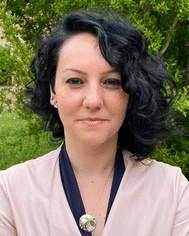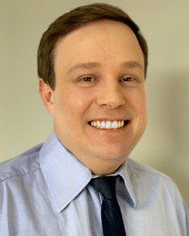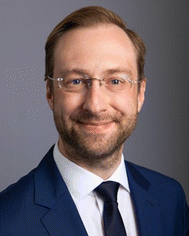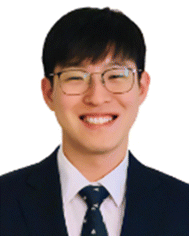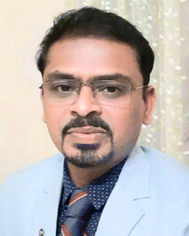Contributors to our Emerging Investigators collection
This Profile article offers a brief insight into some of the researchers who have contributed to this themed collection on the emerging investigators in medicinal chemistry and the great work that is being done by them. We would like to congratulate them and their teams on their achievements to date and hope they have continued success in the future as they continue their careers within the medicinal chemistry field.Anupam Bandyopadhyay earned his Master's from Banaras Hindu University and PhD from IISER-Pune in 2013. To gain better proficiency in biochemistry and chemical biology, he joined Boston College as a Postdoctoral Fellow in 2013 and later moved to MIT in 2016. After a short bridging postdoc at NCBS-TIFR in 2018, he has been an assistant professor since January 2019 at the Indian Institute of Technology Ropar, India. His current research includes engineering peptides and hybridizing boronic acid in peptides, for the treatment of cancer and bacterial infection diagnosis. He is fascinated by developing novel biorthogonal tools.
Emily Cherney is a scientific associate director at Bristol Myers Squibb where she is a medicinal chemist responsible for supporting protein degradation programs across the portfolio and expanding the BMS protein homeostasis platform. Emily received her PhD from the Scripps Research Institute in La Jolla, California, where she studied natural product total synthesis in the laboratory of Prof. Phil S. Baran. Since joining BMS, she's had the privilege of contributing to several programs including IDO1 inhibitors, STING agonists, and Helios degraders. Her key areas of interest include synthetic organic chemistry, immuno-oncology, and protein homeostasis.
Antonella Ciancetta is an associate professor in medicinal chemistry at the University of Ferrara (IT) and PI of the Molecular Modelling Lab she established in 2021. After earning a PhD in drug sciences from Chieti University (IT, 2010), she gained experience in academia, public health, and the pharmaceutical industry, holding positions at the University of Padua (IT), NIH (USA), Queen's University Belfast (UK), and Sygnature Discovery Limited (UK). She received a Marie-Curie Individual Fellowship from the EU in 2016 and the “Premio Divisione Chimica Farmaceutica” from the Italian Chemical Society in 2023. Her research focuses on developing and applying structure-based computational methods for GPCR drug design.
Stephen Cochrane obtained an MSci in chemistry from Queen's University Belfast in 2010, and PhD in organic chemistry from the University of Alberta (supervised by Prof. John Vederas) in 2015. After postdoctoral work with Prof. Benjamin G. Davis at Oxford University, he took up a lecturer position at QUB in 2017, where he is now the Chair of Medicinal Chemistry and Chemical Biology. His research focuses on the development of novel antimicrobials that target multidrug-resistant bacteria. In 2024 in broke the Guinness World Record for the fastest marathon and fastest half marathon dressed as a scientist.
Fernando Fumagalli graduated in pharmacy and obtained his PhD in pharmaceutical sciences from the University of São Paulo (FCFRP-USP, Brazil) in the group of Prof. Flavio da Silva Emery. For a short period of his PhD, he worked with C–H activation reactions in Prof. Lutz Ackermann’s group (University of Göttingen, Germany). Since 2019, he has been a medicinal chemistry professor at the Federal University of Santa Maria (UFSM, Brazil) and started his research group LaComBS (Synthetic and Bioactive Compounds Laboratory). His interests include synthesis and chemical functionalization of underexplored heterocyclic cores, focusing on developing new anticancer and anti-infective agents.
David E. Heppner, a Chicago native, earned his B.S. summa cum laude in chemistry from the University of Minnesota and his PhD from Stanford University with Prof. Edward I. Solomon. After postdoctoral work at the University of Vermont as well as the Dana-Farber Cancer Institute and Harvard Medical School, he joined The State University of New York at Buffalo as the J. Solo Assistant Professor of Medicinal Chemistry in 2020. The Heppner Lab focuses on research toward accelerating the pace of drug discovery and creating first-in-class tool compounds to address critical unmet needs in human health.
Tianyue Jiang received her PhD in pharmaceutics under the guidance of Prof. Jianping Zhou in the College of Pharmacy at China Pharmaceutical University. From 2012–2014, she was a visiting scholar in Prof. Zhen Gu's research group in the Joint Department of Biomedical Engineering at the University of North Carolina at Chapel Hill and North Carolina State University. She is currently a professor at the School of Pharmaceutical Sciences at Nanjing Tech University. Her group studies controlled drug delivery, bio-inspired materials, and nanobiotechnology.
Yong Woong Jun received his undergraduate degree in chemistry from POSTECH and completed his PhD at the same institution under the mentorship of Prof. Kyo Han Ahn. He pursued postdoctoral research on DNA repair mechanisms at Stanford University, working with Prof. Eric T. Kool. In 2023, he began his independent career as an assistant professor of chemistry at KAIST. His research focuses on the study and application of mechanisms of DNA damage and repair processes.
Hyejin Kim earned her PhD in organic chemistry from Seoul National University in 2015 and completed postdoctoral training at the Max-Planck-Institut für Kohlenforschung in Germany. She joined the Korea Research Institute of Chemical Technology (KRICT) in 2018, where she is currently a principal research scientist. Actively engaged in medicinal chemistry research at KRICT, she works at the Infectious Diseases Therapeutic Research Center, focusing on the development of antiviral therapeutics. Her research aims to create innovative treatments for infectious diseases, cancer, and immune-related disorders.
Bijo Mathew is a professor in the Pharmaceutical Chemistry Department at the Amrita School of Pharmacy, Amrita Vishwa Vidyapeetham, Kochi, India. Mathew obtained his MPharm in pharmaceutical chemistry from the Tamilnadu Dr. M.G.R. Medical University, India, in 2008 and PhD in pharmaceutical sciences from Jawaharlal Nehru Technological University, Hyderabad, India in 2016. Mathew's primary focus areas are drug design and molecular modeling. He was listed on the Top 2% Scientists category from the world Stanford/Elsevier list in 2020 to 2024. He has published 255 papers, [h-index: 46, number of citations: 7016 in Google Scholar), (h-index: 43, number of citations: 5836 in Scopus).
Afjal Miah joined GSK in 2006 and has worked on projects in respiratory, immuno-inflammation and cancer. In 2015 he obtained his PhD in collaboration with the University of Strathclyde, developing novel CCR4 antagonists. Since 2011, Miah has gained extensive experience leading discovery and optimisation projects for PROTACs and E3 ligases. He helped design GSK's proprietary PROTAC libraries, and more recently, collaborated with GSK's High-Throughput Chemistry group, to develop an integrated direct-to-biology platform for PROTACs. Miah is currently a Scientific Team Leader in the Modalities Platform Technologies group, where his work focuses on developing proximity inducing drugs for therapeutic targets.
Sanghapal Sawant graduated with his BSc and MSc from the SRTM University, Nanded, and received his PhD in chemistry jointly from CSIR-IIIM, Jammu and the SRTM University, Nanded (India). His research group focuses on medicinal chemistry and the development of application oriented synthetic methodologies. Before moving his research group to CSIR-NCL, Pune, he worked as a scientist at CSIR-IIIM until December 2023. Currently, he is a senior principal scientist and also holds a faculty post as professor at AcSIR-India. In a short stint as a Raman Research Fellow, he worked at Kyoto University in Japan for his postdoctoral research in chemical biology.
Amit Shard, a faculty member at NIPER Ahmedabad since 2014, is a leading researcher at the intersection of chemistry and biology, with a focus on cancer therapies and pain research. He holds an MSc in pharmaceutical chemistry and a PhD from CSIR-IHBT, India. Shard's work targets pyruvate kinase M2 (PKM2) in cancer, exploring organometallic and sulfonamide-based compounds, and includes innovations in carbohydrate kinase inhibitors for pain and inflammation. With over 60 publications, two patents, and multiple awards, he exemplifies excellence in multidisciplinary research and translational drug discovery.
Clinton Veale is an associate professor of organic chemistry at the University of Cape Town. He has a broad interest in organic chemistry, chemical biology and biophysical chemistry (particularly native mass spectrometry) and the development of tools for exploring transient protein–protein interactions, extracellular space and host–pathogen interactions and their applications in drug discovery and medicinal chemistry. Veale was a recipient of a Royal Society – African Academy of Sciences, FLAIR Fellowship, and is currently a member of the early-career advisory boards of the Journal of Medical Chemistry and ChemMedChem.
Xiaoyu Zhang obtained his BS and MS degrees from Zhejiang University under the mentorship of Prof. Zhongjun Ma. He completed his PhD in chemistry and chemical biology in 2017 at Cornell University, where he studied with Prof. Hening Lin. As a Damon Runyon Fellow, he conducted postdoctoral research with Prof. Benjamin Cravatt at the Scripps Research Institute. In 2022, Zhang started his independent career as an assistant professor in the Department of Chemistry at Northwestern University. His research group focuses on leveraging chemical biology approaches to expand the druggable proteome of human cells and develop chemical probes for protein targets that remain therapeutically inaccessible.
| This journal is © The Royal Society of Chemistry 2025 |



